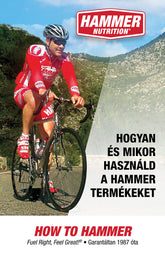Edible oil extraction
By Dr. Bayne French MD DC
Hammer Nutrition Prefatory Comments: For more information on Bayne’s recommendations of edible seed oils, you’ll want to read or reread his article, Seed Oils Revisited. Pay close attention to his “Action Items,” one of which is: “Toss from your home the 3 S's and 3 C's: Soy, Sun, Safflower, Canola, Corn, and Cottonseed.”
Astute and inquisitive readers have written in with questions about the health benefits of various oils. For instance, walnut oil. For the left-brain-dominant, linear thinkers out there: Walnuts good = walnut oil good. Orderly, sequential, predictable. Not necessarily correct.
For example, It’s a gorgeous, hot August day on the Nushagak River in Southwest Alaska. The Coho salmon are running thick. You hook and land a spunky 12-pounder, still fully silver, having left the salt water the day before. You’ve been upriver for a week, so all the ice is gone from your Yeti knockoff cooler, which was still freakishly expensive. In the middle of pictures, your dirtbag buddy hooks another fish. And then another. Your original fish lies in the sun for an hour before someone accidentally steps on it, squirting it to the bottom of the boat, where it lays in the bilge for a few more hours. Later that evening you make it back to camp, only to see that on the other side of the electric bear fence stands a giant Brown bear. This loosens everyone’s bowels and creates a major delay with all the screaming and pepper spray deployment. When calmed and knickers changed, a lengthy game of rock, paper, scissors ensues, as no one wants to clean fish by the shore, what with the bear and mosquito hoards. Eli loses again, and it’s clear he never really understood the game, making figures with his hand that remain unidentified. Several hours after being caught, the source salmon is tended to. It’s stiff and warm. Eli is the worst at filleting. Left are a couple of pieces of meat that look like they were subject to a Ginsu demonstration. He drops one in the sand while hustling back to the relative safety of the Cabela’s Guide tent. Also, freakishly expensive. After a couple of games of cribbage and a few warm beers, the “fillets” are cleared of flies and coated in Panko. They, with copious Canola oil, are then torched in a crap aluminum pan. What resulted was not a pleasurable dining experience. Salmon good = not good salmon meat. Right-brainers rejoice!
So…there’s many a slip between a cup and a lip—one of my favorite cliques. I won’t mansplain it. Provided that a quality product is even started with, the extraction of oils is replete with potential problems. And then how is that oil handled? Rhetorical question. To mass produce an edible oil in a cost-effective way makes me suspicious that the process started with quality and well-cared-for raw material, is extracted in a non-toxic way under relatively low temperatures, and is then handled and packaged in a way that limits exposure to damaging air and light. Maybe I’m just suspicious by nature.
Let’s stay with fish for a bit. Anas et al. (Int.J.Curr.Microbiol.App.Sci 2020) wrote about the process of extracting oil from fish. Within this article the myriad health benefits of the omega-3 fats DHA and EPA are mentioned and referenced, as are methods of extracting these oils.
The quality of the end product depends on the type of raw material (not in our control), the quality of the raw material (not in our control), and the type of extraction method and extraction conditions (not in our control). Wet Reduction is the most commonly employed method that involves 3 steps: cooking, pressing, and centrifuging. Such a method, according to Anas et al. has serious setbacks in terms of the quality of oil obtained as high temperature employed for the extraction process results in degradation or decomposition of the thermally labile compounds resulting in production of oxidized oils. I’ve written about oxidation. It ain’t good if longevity is something you aspire to.
Now substitute walnuts, olives, almonds, avocado, grape, or heck, even watermelon seeds into the above two paragraphs; the story is the same.
Gong et al. (Spec. Oils Fats in Food and Nutr. 2015) wrote about tree nuts, their fat profile, and oil extraction methods. Tree nuts include pine, pecan, walnut, almond, Brazil, cashew, hazelnut, macadamia, and pistachio. Their respective fat profiles differ significantly in regard to the relative percentage of saturated, monounsaturated, and polyunsaturated fats they possess. What seems clear is that the different oil extraction methods do not alter the respective nuts’ fat profile. More oil (higher yield) is possible using solvents and also by roasting the nuts. Solvents like hexane are toxic. Additional methods are needed to attempt solvent removal. The oils, particularly the polyunsaturated fats, are delicate and easily damaged. Not only are the health benefits then lost, but these damaged oils may also be harmful.
Cold-pressed, expeller-pressed, wet reduction, enzymatic-assisted extraction, supercritical fluid extraction (SFE), microwave-assisted extraction (MAE), ultrasound-assisted extraction (UAE), solvent extraction, and pressurized liquid extraction (PLE) are just some of the methods employed to extract oil from stuff. They differ significantly in cost, yield, heat, pressure, and other employed parameters. I don’t understand them all, nor do I care to.
I’m not a Nutraceutical, Food, and Nutritional Science PhD. I am a clinician, more prone to think practically of human health problems. And I don’t think it’s practical or globally sustainable to eat wild-caught fish all the time. Maybe you don’t like it, burp it up, lack all the outdoor skills necessary to catch it, or are just miserable at cooking it. Maybe you’re of a vegetarian persuasion. In general, eating the original product, I feel, is preferred (wild-caught fish, organic raw nuts and seeds, minimally processed nut and seed butter, avocados, etc.). Using oils for cooking and as a supplement can be beneficial. The more expensive oils from a reputable company are reliably better. Stick with olive and avocado. Keep them in a dark place, and don’t subject them to high heat. Don’t be like Eli, and drop them in the sand.











